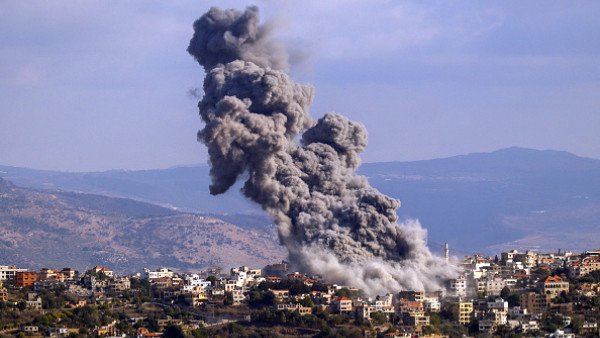Lebanon’s villages along the border with Israel have borne the brunt of the conflict [Getty]
Israeli soldiers are leaving Google reviews mocking the trail of destruction they have left behind in southern Lebanon amid their invasion and ongoing war on the country.
The Israeli military began crossing the border into south Lebanon on 1 October, about a week after year-long cross-border hostilities with Hezbollah spiralled into a full-blown war.
Tel Aviv calls its incursion “limited operations” that seek to destroy Hezbollah’s infrastructure and ultimately dismantle the Iran-backed group. They came after Hezbollah’s leader and much of its senior command structure was eliminated.
Since then, dozens of localities have been reduced to rubble. Israeli soldiers often record themselves celebrating right after detonating a village, as massive plumes of smoke rise from what was once a residential neighbourhood.
At least 37 border towns and villages have so far been destroyed, according to Lebanese state-run National News Agency. Analysts say Israel is adopting a scorched earth policy, which seeks to create a security zone along the frontier, preventing residents from returning when the war ends.
The use of white phosphorus since the fighting began in October last year has also contaminated the soil, making it extremely difficult to cultivate the land.
“No mosque, only rubble and a blocked tunnel entrance. I went for nothing. Do not recommend,” one Israeli wrote under a review for Ahel el-Quran Mosque in the border village of Dhaira, which sits less than 200 meters away from the UN-administered Blue Line.
“It seems that Google is lying, there is no mosque there, only the ruins of a building. Odd,” another person wrote about the same mosque.
“The new renovation came out a bit too flat but still much better than it was before,” another review read.
Dhayra, like many of the border communities at the forefront of the conflict, has borne the brunt of Israeli military violence.
On Mays al-Jabal Hospital which has been forced to shut because of the fighting, one person wrote: “Just disappointing, it said that it was open in the morning, we arrived and it was closed!”
They added: “Really bad service. There are no good conditions for staying. But other than that, there was (a lot)…” continued with flame emojis.
At least five hospitals in south Lebanon have been forced to close because of Israeli shelling and airstrikes. Nearly 180 medical workers have also been killed.
Mhaibib, Blida, Kfarkela, Houla, Aytaroun, Maroun el-Ras, Ramyeh and Ayta al-Shaab are some of the other villages which have been devastated by the detonations or military operations.
In Ramyeh, the Israelis left mocking reviews about a gym.
“Overcrowded gym – the Merkava tanks occupied all the machines,” one person wrote.
Over 3,100 people have been killed and nearly 14,000 others have been wounded in Lebanon since the fighting erupted in October last year, in parallel to the war on Gaza, after Hezbollah said it was starting a “support front” for the Palestinians.
Most of the civilian casualties have occurred since September.
Despite being dealt heavy blows, Hezbollah fighters have continued to repel Israeli forces. The group has also continued to fire rockets and drones into northern Israel, resulting in some casualties there.
Hezbollah has vowed to continue the fight, and its newly appointed leader said in a prerecorded speech earlier this week that “tens of thousands of trained combatants were ready to battle” the Israeli military.
But the Shia militant group has also voiced its readiness for a ceasefire, saying Israel must stop attacking Lebanon first.
